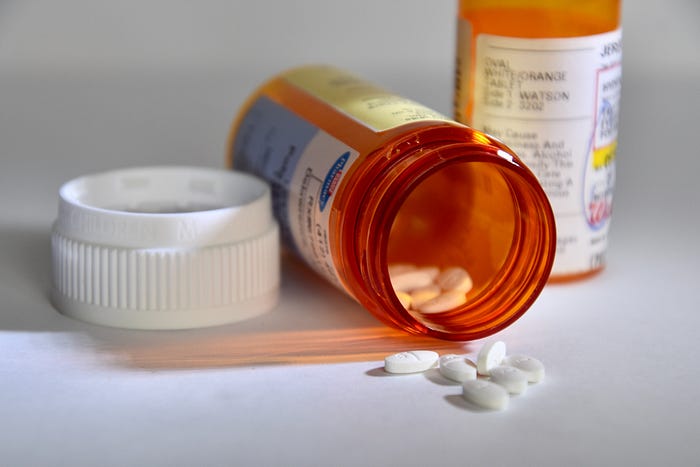PPI Medications and Your Gut: Here’s What You Need to Know
Think of your bug friends.

Proton Pump Inhibitors (PPIs) are some of the most commonly prescribed medications in the US. Their indicated use includes erosive esophagitis (a severe form of GERD), functional dyspepsia, & peptic ulcer disease. You yourself may have even purchased some over the counter PPIs (Prilosec, Nexium) that time you over indulged on your moms homemade french toast.
As we used to say in my undergraduate economics classes, “There is no such thing as a free lunch.” These medications don’t come without their side effects. As we’ll touch on throughout this article, the relevant gut side effects include changes in the gut microbiome, specific bacterial infections, and Small Intestinal Bacterial Overgrowth (SIBO).
Widespread Use
As I previously mentioned, PPIs are very popular prescription medications, having increased in use 18% from 2002–2017 (1). With such widespread use, one potential risk is when PPIs become prescribed off-label: meaning not for their traditional use. Over half of the use of PPIs is for non-indicated purposes, such as non-specific abdominal pain (2). Off-label prescriptions have their place, allowing physicians to try alternative measures of treatment. But this can also lead to people being on them longer than they should.
Think about yourself: Have you ever been to the doctor with some sort of GI issue, where they don’t know exactly what’s occurring, and been given a PPI anyway? That’s not necessarily the fault of the doctor, it’s almost a side effect of being american. When many people go to the doctor, they have an expectation that they’re going to get something, a drug likely. The doctor wants to make their patient happy, and if they’re expecting a drug, they will likely get a drug. Call a spade a spade.
The notion that all prescription drugs should be avoided in favor of “natural supplements’’ is a bit misconstrued. They are instances where PPIs can be life-saving, such as the prevention of Barrett’s Esophagus progression to esophageal cancer. Please do not abruptly stop taking your medications without first speaking with your doctor, as you can actually get a large increase in acid production, called rebound hyperacidity.
What’s Normal
To think about the potential side effects of a drug, we first have to think about what normal physiology the drug is altering/preventing/blocking. In the case of PPIs, they are preventing the secretion of stomach acid. That begs the next question, what do we need stomach acid for?
We need an acidic environment (remember that pH scale from high school science) in order for certain digestive enzymes to function, to kill off potential bad bugs in food, and to allow absorption of nutrients such as Iron and B12 . There is evidence of nutrient deficiencies while being on PPIs long term, especially magnesium (3). This effect is less noticeable for short term users, so I wouldn’t worry about nutrient deficiencies from that one day you had mom’s french toast.
Our Favorite Bugs
We can’t have a discussion about gut function without mentioning the microbiome, the ecosystem of bacteria, yeast, and viruses living inside of us. There’s evidence that 4 weeks on a PPI leads to changes in the microbiome that mimicked the microbiome of someone with Clostridium Difficile (C. Diff.) infection (4). Let me tell you, that’s not a microbiome you should shoot for. C.Diff is normally kept in check by our “good gut bugs,” but as we’ll continue to discuss, PPI use doesn’t create an environment our good bugs can thrive in.
It’s not the direct effects of PPIs, but its indirect effects that could drive this change. Since PPIs alter stomach acid, and an acidic stomach is needed for proper protein digestion, more undigested protein could perceivably make its way to the intestines. Why does this matter? Undigested protein could feed potentially harmful bacteria (dysbiotic bacteria), thus favoring their growth and an unfavorable shift in the microbiome (less good, more bad). Gut bugs need food too. They prefer to ferment (feed off of) carbohydrates and fiber (itself being undigested), but they can also ferment protein. The organisms that ferment protein are the potential dysbiotic bugs.
Even a 2019 paper from The World Journal of Gastroenterology concluded that “The evidence indicates that PPIs…are able to modify the host microbiota in each segment of the GI tract and can contribute to dysbiosis development; this dysbiosis can, in turn, facilitate the onset of certain GI disorders” (5). They’re saying dysbiosis can happen anywhere along the gut, and this dysbiosis could lead to certain GI conditions. Gut dysbiosis has been implicated in digestive diseases such as IBS and IBD.
If being prescribed a PPI, speak with your doctor about the microbiome implications and ask what strategies you can employ to support your microbiome during that time.
Our Not So Favorite Bugs
A systematic review and meta-analysis (highest quality of scientific study) involving over 350,000 patients found that PPI users were 2x as likely to obtain a C. Diff. infection compared to non-users (2). The normal microbial environment of the gut keeps C. Difficile at bay by out-competing it for nutrients. If the microbiome becomes depleted or altered (from PPI use), there is greater opportunity for C. Diff. to thrive and grow.
PPIs alter the microbiome → C. Diff. has a greater chance to obtain nutrients → C. Diff. allowed to grow and potentially cause symptoms (diarrhea)
The hallmark symptom of a C.Diff infection is diarrhea, and lots of it. Antibiotic use, which also depletes some good gut bugs, also creates an environment where C.Diff can thrive, leading to the symptoms of antibiotic associated diarrhea (Check out this FREE guide on strategies to keep your microbiome and your gut thriving while on antibiotics).
SIBO used to be understood as having too many bugs in the small intestine (hence the name), but new research shows that it’s not too many bugs, but rather too many “bad bugs,” again, termed dysbiotic bugs, that lead to SIBO (6).
Chronic treatment with PPIs can lead to the development of SIBO (7). As previously mentioned, stomach acid helps fight off potentially harmful bacteria, and without stomach acid, these bacteria could make their way into the small intestine still alive. I don’t know about you, but if certain bugs aren’t supposed to live in the gut, I don’t want them to win the lottery.
Another indication for PPIs is to protect your esophagus from NSAID (non-steroidal anti-inflammatory drugs) related damage. However, PPIs may exacerbate damage to the mucous layer in the small intestine brought on by NSAIDs (5). So that might protect one region of your gut, while subsequently harming another. Again, why do we care? Conditions such as Celiac, Inflammatory Bowel Disease, and SIBO are characterized by inflammation and potential damage to this same mucous layer of the small intestine. Talk about a double whammy.
PPIs have their place in society, but their widespread use continues to lead to more potential side effects. If you find yourself struggling with any symptoms of heartburn, acid reflux, indigestion, or belly pain, I highly encourage you to seek out the support of a Functional Medicine Practitioner. They can help identify the root cause of your health concerns, rather than just masking symptoms, and be your biggest “health cheerleader” in the healing process.
If you did enjoy this article, I’d really appreciate it if you looked at the upper left hand corner, and gave the article an applause. If you’d like further information on optimizing your gut health, living with autoimmunity, and listening to me rant, make sure to give me a follow as well or hit the email notification button to get notified whenever I publish a new article.
As always, Trust in Your Gut.
Disclaimer: The contents of this article are for educational purposes only, and are not intended to diagnose or treat any condition. Do not apply any of the information in this article without first speaking with your doctor.
References
- Mishuk A, Chen L, Gaillard P, Westrick S, Hansen R, Qian J. National trends in prescription proton pump inhibitor use and expenditure in theUnited States in 2002–2017. Journal of the American Pharmacists Association. 2021;61(1):87–94.https://doi.org/10.1016/j.japh.2020.09.015.
- Trifan A, Stanciu C, Girleanu I, et al. Proton pump inhibitors therapy and risk of Clostridium difficile infection: Systematic review and meta-analysis. World J Gastroenterol. 2017;23(35):6500–6515. doi:10.3748/wjg.v23.i35.6500
- Jaynes M, Kumar AB. The risks of long-term use of proton pump inhibitors: a critical review. Ther Adv Drug Saf. 2018;10:2042098618809927. Published 2018 Nov 19. doi:10.1177/2042098618809927
- Seto CT, Jeraldo P, Orenstein R, Chia N, DiBaise JK. Prolonged use of a proton pump inhibitor reduces microbial diversity: implications for Clostridium difficile susceptibility [published correction appears in Microbiome. 2016;4:10]. Microbiome. 2014;2:42. Published 2014 Nov 25. doi:10.1186/2049–2618–2–42
- Bruno G, Zaccari P, Rocco G, et al. Proton pump inhibitors and dysbiosis: Current knowledge and aspects to be clarified. World J Gastroenterol. 2019;25(22):2706–2719. doi:10.3748/wjg.v25.i22.2706
- Saffouri GB, Shields-Cutler RR, Chen J, et al. Small intestinal microbial dysbiosis underlies symptoms associated with functional gastrointestinal disorders. Nat Commun. 2019;10(1):2012. Published 2019 May 1. doi:10.1038/s41467–019–09964–7
- Freedberg DE, Lebwohl B, Abrams JA. The impact of proton pump inhibitors on the human gastrointestinal microbiome. Clin Lab Med. 2014;34(4):771–785. doi:10.1016/j.cll.2014.08.008
